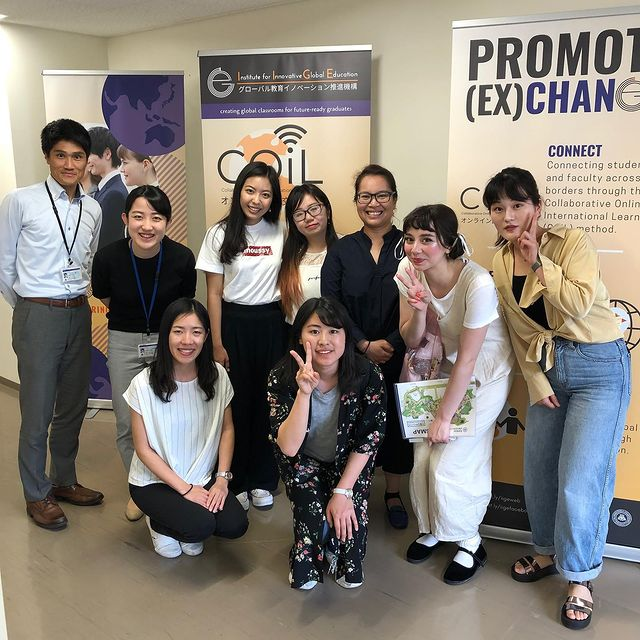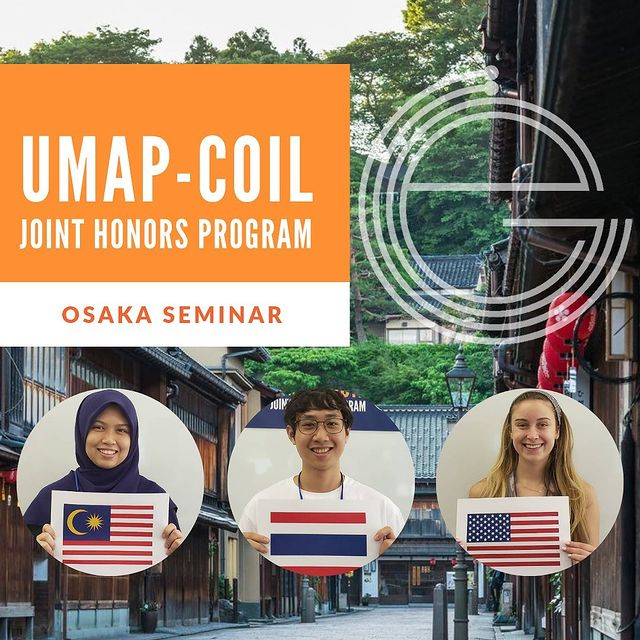In an increasingly globalized world now shuttered by the 2020 COVID-19 pandemic, higher education institutions are looking to VE (Virtual Exchange)/COIL (Collaborative Online International Learning) as the next frontier for providing students with meaningful international education and intercultural experiences. Kansai University is transforming the challenges posed by the COVID-19 crisis into a chance to advance international higher education with its U.S. and global partners. Kansai is taking on various Internationalization at Home (IaH) initiatives on its campus, including internationalizing its existing curriculum by adopting practices like COIL.
While the practice of competency-based virtual exchange at Japanese higher education institutions (HEIs) dates back over two decades to Waseda University’s Cross-Cultural Distant Learning (CCDL) program in Japan, Kansai University pioneered the concept of COIL domestically in 2014. Kansai University’s first COIL partnership was with the State University of New York (SUNY) COIL Center (USA). Sparked by Kansai University faculty member Keiko Ikeda and SUNY COIL Center global partner network consultant Jon Rubin, who first met at a conference in Kyoto in 2013, the partnership was a mutual benefit for both institutions. Kansai University was in the process of developing a new internationalization strategy called the Triple I - Intercultural Immersion Initiative. The initiative clearly outlined the instatement of COIL-based education programs as a part of a university-wide initiative to make global learning more accessible to Kansai’s 30,000 students. SUNY was in the process of expanding its global reach and had yet to establish a COIL partnership in Japan.

COIL Plus Mobility Program, 2019, Fashion Institute of Technology and Kansai University.
In June 2014, Kansai University became the first Japanese university to join the SUNY COIL Global Partner Network. It did not take long for the first Kansai-SUNY COIL courses to take place, and by the fall 2014 semester, Kansai University hosted its first international COIL symposium with the SUNY COIL Center and MEXT.
Kansai University rapidly scaled up its COIL offerings in the next four years. And by 2018, as part of receiving a five-year Ministry of Education, Culture, Sports, Science and Technology (MEXT)’s Inter-University Exchange Project (2019) grant, Kansai University created the Institute for Innovative Global Education (IIGE) (Inter-University Exchange Project (Reinventing Japan), 2018). IIGE is committed to helping faculty design each COIL course to spur highly transferable skills that will equip students to be “future ready” not just in terms of their global employability but also their ability to help solve tomorrow’s global issues. One of the main goals of the MEXT grant was to promote VE/COIL partnerships between higher education institutions in Japan and the United States. Kansai University was selected by MEXT to provide direct COIL training, networking opportunities, and support to nine other Japanese institutions along with their U.S. COIL partner institutions.
Creating a U.S.-Japan COIL Partnership Community
From 2018 to 2020, IIGE facilitated COIL partnerships with 12 universities in the U.S. as well as with other countries around the world. James Madison University, Western Washington University, Clemson University, Fashion Institute of Technology (SUNY), and the University at Albany (SUNY) are just a few examples of new U.S. institutional partnerships formed with the intention of pursuing joint COIL projects.
Within a six-year timeframe, Kansai University has implemented over 69 VE/COIL courses across multiple disciplines for the benefit of 2,436 Kansai students, establishing a vast network of COIL partners both domestically and abroad. This includes implementing 42 COIL programs with the following 23 U.S. institutions:
Penn State Beaver
Fashion Institute of Technology
Nassau Community College
University of California, Berkeley
Kapi'olani Community College
University of Hawaiʻi at Hilo
James Madison University
University of Illinois at Urbana-Champaign
Clemson University
The State University of New York at Albany
Xavier University
Northern Arizona University
Northern Illinois University
Western Washington University
DePaul University
Mira Costa College
Eastern Oregon University
Texas A&M University
Vanderbilt University
Otterbein University
Texas Tech University
University of Washington
Michigan State University
Most recently, IIGE, the University at Albany (SUNY), and the Fashion Institute of Technology (FIT) completed a COIL collaboration from April 2019 through February 2020 (U-Albany KU-COIL Plus Program, 2019). The COIL experience culminated with several FIT students visiting the Kansai University campus in June 2019, and Kansai University students visiting both U.S. universities’ New York campuses in February 2020 (FIT students’ Visit Kansai University, Institute for Innovative Global Education, 2019).
Forging New Bonds
While many of Kansai University’s COIL partnerships began in a language learning setting, they grew to take place across interdisciplinary, cross-disciplinary, and multidisciplinary levels—an approach highly suitable to COIL’s online format. In December of 2020, IIGE and the ALLEX Foundation (Alliance for Language Learning and Educational Exchange) partnered to collaborate on the promotion of “language learning focused COIL” (LLC). The ALLEX Foundation is a nonprofit organization based in the U.S. that operates programs to encourage the establishment of high-quality East Asian language programs at educational institutions in the U.S. and Canada. U.S. universities with Japanese language programs and Japanese universities provide tandem-language learning and collaborative projects for students at the undergraduate and graduate levels. The ALLEX Foundation supported Texas Tech University, Vanderbilt University, and Otterbein University with Kansai University to deliver LLC.

UMAP-COIL Joint Honors Program, 2019, IIGE.
The transformation of the international education curriculum through such virtual exchange experiences remains the priority and focus of IIGE. Two prime examples of such programs are the UMAP-COIL Joint Honors Program and Kansai University Engaged/Exchange Online Learning (KU-EOL) program.
For IIGE, partnership building takes place not only bilaterally, but also on a multilateral level. IIGE has been working closely with the University Mobility in Asia and the Pacific (UMAP) consortium, which is composed of over 230 university members from over 13 countries, including member institutions from the U.S. Though the partnership is based primarily on physical student mobility, in 2020, UMAP members offered a seven-week summer program that was entirely online. Approximately 140 students from 14 countries worked together to research key contemporary social issues relating to the United Nations Sustainable Development Goals (SDGs).
Kansai University’s global partner universities were also invited have their students apply to the fall 2020 KU-EOL program. Courses that had originally took place on campus exclusively for domestic students took place online and were open to international student enrollment. Because of its popularity, additional universities signed partnership agreements with Kansai University specifically for enrolling their students in the program. Over 100 students from 17 universities in 11 countries applied for the program, 20 of them from the U.S. Owing to its success, a large-scale KU-EOL Program is planned for the 2021–22 academic year. IIGE also looks forward to when it can continue the COIL plus mobility programs in the future.
About the Authors
Michele Fujii is the specially appointed coordinator and Keiko Ikeda is the vice-director at the Institute for Innovative Global Education (IIGE), Division of International Affairs at Kansai University.